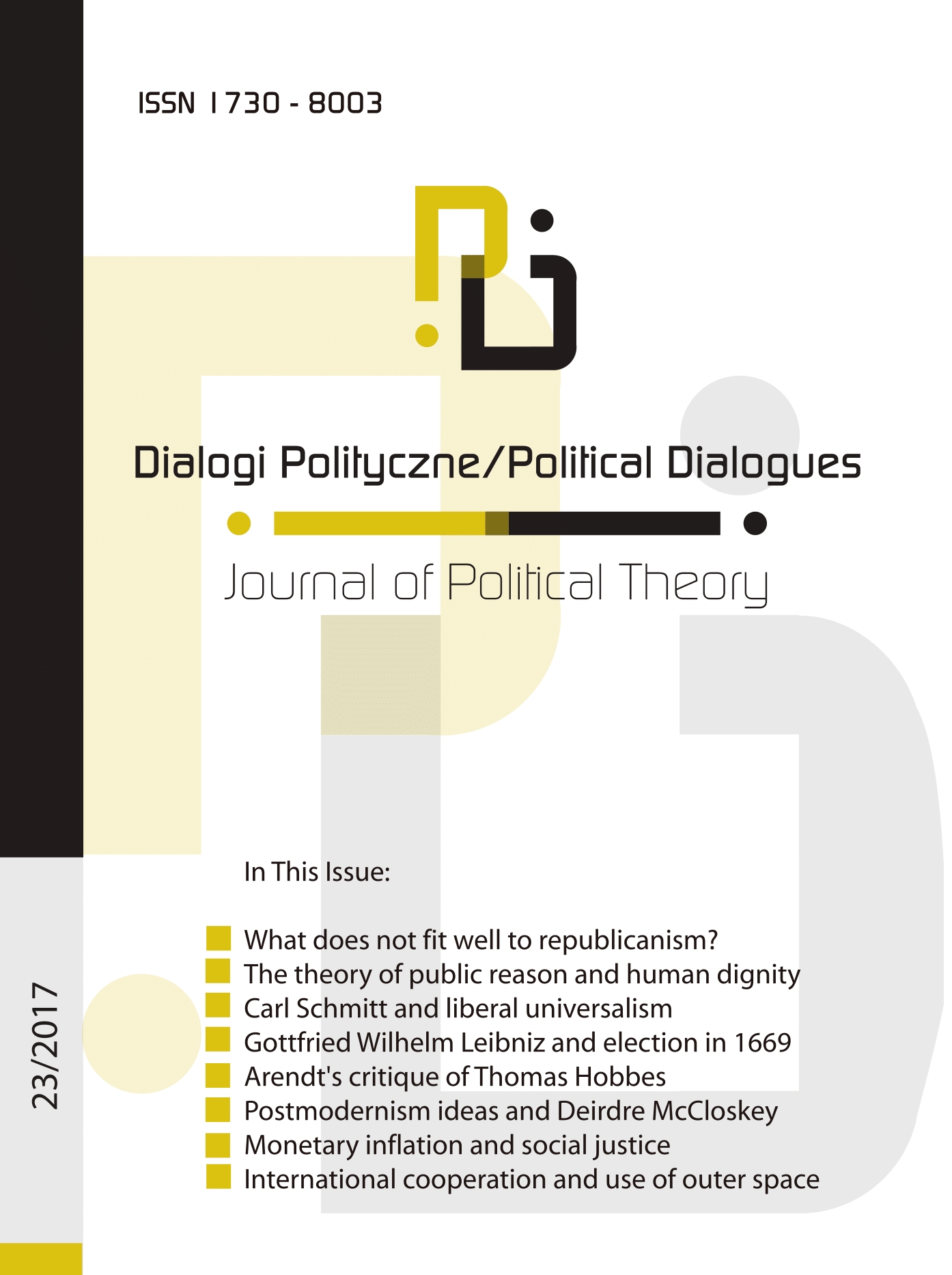Teoria rozumu publicznego a godność człowieka
DOI:
https://doi.org/10.12775/DP.2017.013Keywords:
godność człowieka, rozum publiczny, neotomizm, Tadeusz Styczeń, John RawlsAbstract
In this paper I intend to point at an ambiguous interconnection between the theory of public reason (exemplified by John Rawls and Gerald Gaus), and the idea of human dignity understood as a universally binding, distinguished moral status and inherent value of every human person. The public reason theorist do not examine human dignity at length, whereas, as I am trying to show in the paper, it constitutes a necessary component of the theory. The argument for the necessity of human dignity within public reason boils down to the two main theses: (1) courts, international law bodies, as well as constitutional state authorities constantly refer to human dignity as a crucial commitment present in the law; and (2) public reason theory which sets human dignity aside suffers from an explanatory gap. As a way of providing a solution to this, I propose to examine the neo-thomist ethics developed by Tadeusz Styczeń. As I will show in the paper, combining an attempt the two theories is an interesting research program, and allows to reconcile both human dignity and public justifiability of legal rules.
References
Baur Michael, Law and Natural Law, w:, B. Davies, E. Stump (red.), The Oxford Handbook of Aquinas, Oxford 2012.
Botha Henk, Human Dignity in Comparative Perspective, http://weblaw.haifa.ac.il/en/JudgesAcademy/workshop1/Documents/Henk%20Botha.pdf, (dostęp 28.08.2018).
Chambers Simone, Theories of Political Justification, „Philosophy Compass” 5/1, 2011.
Daly Erin, Dignity Rights, Philadelphia 2013.
Gaus Gerald, Justificatory Liberalism, New York and Oxford 1996.
Gaus Gerald, The Order of Public Reason, Cambridge 2011.
Gaus Gerald, Value and Justification, Cambridge 1990.
Habermas Jürgen, Uwzględniając innego. Studia do teorii politycznej, tłum. A. Romaniuk, Warszawa 2009.
Kant Immanuel, Uzasadnienie metafizyki moralności, tłum. M. Wartenberg, Kęty 2001.
Lebech Mette, On the Problem of Human Dignity, Würzburg 2009.
Nussbaum Martha, Introduction, w: T. Brooks, M. Nussbaum (red.), Rawls’s Political Liberalism, New York 2015.
Piechowiak Marek, Filozofia Praw Człowieka, Lublin 1999.
Piechowiak Marek, Thomas Aquinas – Human Dignity and Conscience as a Basis for. Restricting Legal Obligations, „Diametros” 47, 2016.
Rawls John, Justice as Fairness: A Restatement, red. E. Kelly, Cambridge 2001.
Rawls John, Liberalizm polityczny, tłum. A. Romaniuk, Warszawa 2012.
Rawls John, O idei rozumu publicznego raz jeszcze, w: idem, Prawo ludów, tłum. M. Kozłowski, Warszawa 2001.
Rawls John, Reply to Habermas, [w:] Idem, Political Liberalism, New York 1996.
Rawls John, Teoria sprawiedliwości, tłum. M. Panufnik, J. Pasek, A. Romaniuk, Warszawa 2009.
Sensen Olivier, Kant on Human Dignity, Berlin/Boston 2011.
Shapiro Scott J., Authority, w: J. Coleman, S. Shapiro (red.), The Oxford Handbook of Jurisprudence and Philosophy of Law, Oxford 2002.
Styczeń Tadeusz, Etyka niezależna?, Lublin 1980.
Styczeń Tadeusz, List do gen. Wojciecha Jaruzelskiego, Premiera PRL, w: Dzieła zebrane, t. 5. Człowiek darem, Lublin 2014.
Styczeń Tadeusz, Problem możliwości etyki jako empirycznie uprawomocnionej i ogólnie ważnej teorii moralności. Studium metaetyczne. Rozprawa habilitacyjna, w: idem, Dzieła zebrane, t.2, Etyka niezależna, Lublin 2012.
Tiedemann Paul, Menschenwürde als Rechtsbegriff, Berlin 2012.
Weithman Paul, Why Political Liberalism?, Oxford 2010.
Wendt Fabian, Rescuing Public Justification from Public Reason Liberalism, „Oxford Studies In Political Philosophy” 5, 2017.
Wyrębska-Dermanowić Ewa, Filozofia prawa Immanuela Kanta, Łódź 2018.
Downloads
Published
How to Cite
Issue
Section
Stats
Number of views and downloads: 947
Number of citations: 0



